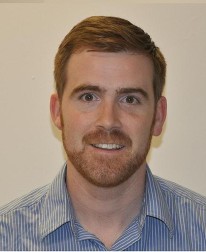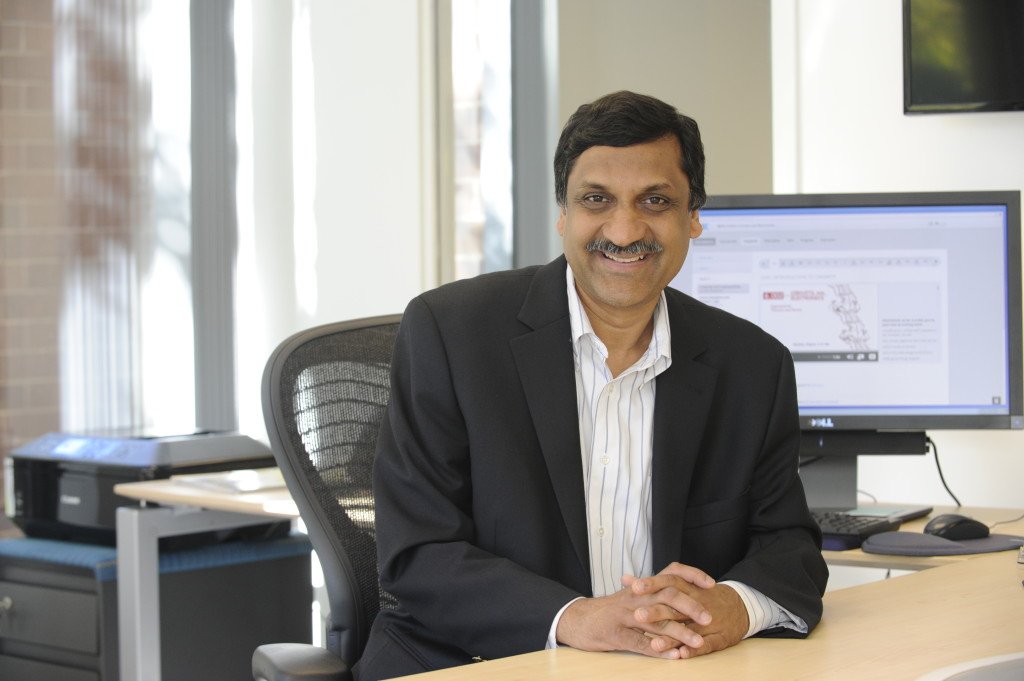by Laurie Pickard | Feb 24, 2015 | Courses, Platforms, and Profs, Thoughts on Higher Ed and Life

Christian Terwiesch is a professor at the University of Pennsylvania’s Wharton Business School. He teaches a popular MOOC, Introduction to Operations Management, which I took last year. That course, along with three other Wharton courses, now form part of the newly launched Business Foundations Specialization from Coursera.
Professor Terwiesch is also a thought leader when it comes to MOOCs and their potential for disruption in the market for business education. Along with Karl Ulrich, another Wharton professor, he authored an excellent paper called “Will Video Kill the Classroom Star?”, which explores the ways in which business schools and professors might come under pressure from new educational technology.
I caught up with Professor Terwiesch recently, and we talked about the Coursera-Wharton Specialization, as well as his current thinking on the future of business education.

LP: I want to start by thanking you. I took your course last year, I greatly enjoyed it, and I learned a lot from it. So thank you for offering it.
CT: I love your story. It’s these kind of stories that make the Coursera world so exciting.
LP: I’d like to ask you about the new Specialization from Coursera that involves all the Wharton courses. I want to ask you about who you imagine will use this and benefit from it the most. Who was the team imagining when the Specialization was created?
CT: I think this is about realizing that we have only a certain number of seats for people coming here to Philadelphia or to San Francisco to take Wharton courses. But there is much more demand, many more people who are interested in business knowledge provided by Wharton. Many people cannot come because they don’t have the financial means, many people cannot come because of geographic constraints. Through Coursera, these folks can get a sense of what Wharton is like without paying the money that you would have to pay to come here, and without moving to Philadelphia.
LP: I’m very excited about the Coursera Specialization, mostly for the possibilities that it opens up. We’re seeing more Specializations and things of this nature, and they are becoming more sophisticated with the inclusion of capstone projects and the involvement of businesses. What do you think we’ll see next in terms of offerings from the MOOC platforms?
CT: I doubt that in the foreseeable future we will be granting a degree based on MOOCs. But the trend goes towards using these courses first in the admissions process, then to start giving credit for them. So it’s only a question of time as to who offers a degree based on them. Certainly on the degree side I would think that the elite institutions will be the most conservative. But it is a trend. That train is rolling.
LP: I read “Will Video Kill the Classroom Star?” which you wrote last year with Karl Ulrich. I loved it, and I wanted to ask you some questions about it. You raised an important point, which is that MOOCs and the like will have a small effect, or even no effect, on top schools like Wharton. What do you expect will be the effect on other business schools?
CT: If you look at the full time MBA programs and you’re not in the top schools – if you are, let’s say, somewhere in the rankings below 50, you already start feeling the heat.
People are increasingly less willing to give up their work, move to a remote place for a two-year education that they could get online.
The same is true now in the executive MBA market, where people say, “I need this for my job, but why should I spend $100,000 for an MBA from the University of Nowhere if I can get it online from Harvard or from Wharton?”
Like it or not, for the business schools, MOOCs are not the great equalizer. As with other examples in globalization and technology, the rich get richer, and the poor get poorer. But, this is the perspective of the schools. For the people, fortunately, I think it’s the opposite. I think it’s wonderful because MOOCs help close the inequality gap. We can provide an Ivy League education to everybody, even if they didn’t have the grades in high school or the means to come here.
LP: As someone who’s studying while working I feel that I get an added benefit from being able apply some of what I’ve learned immediately at work - it’s not just that I’m avoiding the opportunity cost involved with taking time off of work. I have to think this is something that’s attractive to employers as well, and I wanted to hear what you think about that.
CT: We call this “learning on demand” – much smaller chunks of knowledge, studied and applied in real time. I think there’s lots of power in that business model. So will the employers go after it? That could be a real threat to us. I think that’s too early to say right now, but I certainly think that our big recruiters – McKinsey, Goldman, Google – if they all went down that path, that would be the biggest threat to our existence. The question is, could we as Wharton deliver this content on demand, or would McKinsey or Google just say “we’re going to cherry pick the content across all the courses that are available in this online learning space, and then people would study as they’re working for us”. Then we don’t need Wharton anymore. The problem with that model for the business schools is this whole idea of certification.
Certification is really only needed if you have studied for a long time and you haven’t deployed these skills. If you study a new skill and then deploy it the next day, I don’t need to certify you anymore.
You can just write on your CV how you’ve completed a successful merger or acquisition. I don’t need to write you a certificate that you’ve studied it. You actually are self-certified for having been successful on the job. So that I think is a big threat to our existence.
LP: Do you think that’s inevitable? Or is there still a market in which a certification could be highly valuable?
CT: Let’s start with the undergraduate market. Is somebody really going to go and take a high school student and throw them on the job and say you’re going to learn on demand? A young person needs a couple of years of personal development, some education, and because of our scale, we can provide both of this efficiently and at high quality. In the MBA case, it’s a little less clear whether that is the right model to deliver the knowledge. We’re back to this observation that we made in the paper that you really have to think of the business school as a bundle of services that we provide. There is the learning, there is the certification, but there are other aspects around networking, career management, and fun that you would lose if you acquire your knowledge on-demand. As long as we keep the learning as an integral part of a broader experience we will provide our service with a certain integrity that cannot be unbundled.
LP: I want to push you on that. Clearly the content can be unbundled. Do you see other opportunities for entities outside the university to capture other pieces of the bundle?
CT: Well my joke has always been that I’m afraid of a merger between Coursera and Club Med. If our story is that the experience of being around other students and the social interaction is so critical to what we do, then look, that is what Club Med is built around. You sprinkle in Coursera with the content. If those two merge, you have a business school. It’s a joke, but I think there’s some truth in it. There’s no reason to believe that we are the only place in the world where you could have a good time and learn something.
LP: I have one final question for you which is something very dear to my heart, and that is to hear your thoughts on the potential for MOOCs to increase access to business education in the developing world.
CT: As a research university we have a very funny business model where you write an academic paper for hundreds of thousands of dollars and then give them away for free. We train doctoral students at the expense of hundreds of thousands of dollars, and then they go and work for our competitors. We are used to doing work which benefits others. So which customer would be more honorable to serve than the poorest members of our globe? The more we can have these courses be delivered in regions that typically don’t have access to education at our level, or even within the US, a society with large income discrepancies, the more we are true to our mission as a university.
by Laurie Pickard | Feb 9, 2015 | Career Development, Community and Networking, MOOC MBA Design, Most popular posts
I’m pleased to share a guest post by Nick Switzer, who offers a tremendous example of how a MOOC MBA can be even more valuable than a traditional MBA. For those considering a No-Pay MBA, I expect you’ll find his story as inspiring and intriguing as I did. Enjoy! -Laurie
Why I turned down a company-paid MBA for a No-Pay MBA
 Everyone pursuing a No-Pay MBA is doing so because they cannot afford a traditional paid, brick and mortar MBA, right? A No-Pay MBA is the only option; otherwise, we would all enroll in traditional MBAs, right?
Everyone pursuing a No-Pay MBA is doing so because they cannot afford a traditional paid, brick and mortar MBA, right? A No-Pay MBA is the only option; otherwise, we would all enroll in traditional MBAs, right?
Not necessarily.
I work for a fantastic company with great benefits. One of those benefits is tuition reimbursement. If I take university courses that pertain to my role at the company, then the company pays for my tuition. As an engineer transitioning to a more business-oriented engineering role, I needed some financial and business training. My managing director (let’s call him Steve) knew this, and during a one-on-one lunch he suggested that I pursue a traditional MBA, taking advantage of the company’s tuition reimbursement policy.
I was flattered. Steve was my manager’s manager, a role model in the company, and he was telling me that the company would fund my MBA! However, after some deliberation, I declined this offer in favor of a No-Pay MBA using Coursera and other MOOC providers.
Why did I do this? How could I turn down such a generous benefit from my company?
I’ll give you 5 big reasons.
1. I value my time with my family.
When I started my No-Pay MBA, my wife and I were expecting our first child. My wife was a successful marketing manager for a Fortune 500 company at the time, with no plans to leave her role after maternity leave. I was committed to supporting her career, our family development, and my own career. I did not think it was possible to both perform well at my job and be a supportive father and husband, all while attending MBA classes and studying.
With a No-Pay MBA, I watched half of each weeks’ lectures in the same amount of time I would have spent in traffic commuting to off-site classes. Often I would do my courses while my child was sleeping, either early in the morning or late at night.
In this way, MOOCs allowed me to maximize time with my family.
2. I needed to learn quickly and apply my skills immediately.
In my new role, I needed business strategy and finance understanding immediately! Time lost taking the GMAT, GRE, selecting a program and applying meant real business opportunities lost. Through MOOCs, I was able to access top educational content within minutes of choosing my courses!
By the time director Steve suggested I start a paid MBA, I had already started 2 courses that were paying dividends in the office.
I immediately applied principles learned in class in the workplace with many co-workers who had graduated with paid MBAs, honing my learning in real-life scenarios.
Unlike a traditional MBA, I have the ability to share course materials directly with my co-workers as well. This has resulted in empowering my project teams to learn principles on the fly, when they need them most.
3. I wanted to choose my courses based on what would be most helpful at work.
One of the things I love most about MOOCs is the ability to craft my own curriculum.
I have a passion for data-driven decisions, so I am taking a 10-course Data Science specialization from Johns Hopkins as a focal point in my No-Pay MBA.
This type of curriculum flexibility and the ability to take courses from multiple top universities is simply unbeatable.
This was also helpful to my company because I was able to take the courses I needed immediately. I needed financial analysis and negotiation strategy, and I was able to take those courses right away.
4. I saved my company a lot of money.
In the recession of 2008, many companies suspended their tuition reimbursment programs for at least 6 months. I did not want to see my further education as a financial burden to my company.
As a responsible employee of my company, I made a serious cost-saving decision in pursuing a No-Pay MBA. This was an easy point for my director to understand.
My company is still investing in me, more in time commitment than in cash. This investment has paid off quickly, as my No-Pay MBA has armed me with frameworks that allow me to attack problems quickly.
5. I want MOOCs to succeed!
I believe broad, low-cost access to excellent educational materials will help our world, enriching lives and offering new paths to personal achievement and more stable economic conditions.
I want my daughters to live in a world where they have access to top-notch education without going into significant debt.
I want to see MOOCs succeed. What better way to help this happen than as a living example of the power of low-cost online education?
The Results
 Since I started my No-Pay MBA, my wife and I have been fortunate enough to have two great little daughters. My wife has been promoted, and because our schedules aren’t in conflict, she has been able to go on several international work-trips while I take care of the kids after work.
Since I started my No-Pay MBA, my wife and I have been fortunate enough to have two great little daughters. My wife has been promoted, and because our schedules aren’t in conflict, she has been able to go on several international work-trips while I take care of the kids after work.
On the job, I use frameworks and concepts from my courses every day. Thanks to my No-Pay MBA, I am totally comfortable having high-level financial and business strategy discussions with graduates from traditional MBA programs. I have also earned a promotion since starting this adventure in non-traditional education.
Bottom line: a No-Pay MBA aligned better with my goals of work-life balance and prioritization of my family than a standard MBA would have. It has been fantastic for my family, for my company and for me.
Nick Switzer is an engineer, a German-English technical translator, and a lifelong learner. To see his complete MOOC MBA transcript, visit www.nickswitzer.us.
by Laurie Pickard | Jan 23, 2015 | Career Development

Hi,
I am very interested in this concept of the No-Pay MBA. After single handedly paying and continuing to pay for my undergraduate education my quest for my MBA seems to slip further and further from my grasp. I have often thought about taking these online courses but I still don’t understood their legitimacy in the business world.
If I took the full course work outlined in your curriculum and/or through researching alternative MOOC classes, will the coursework be recognized by employers? Can I legitimately put MBA on my resume?
Please let me know.
Thank you,
J
 Dear J,
Dear J,
Thank you for your message. I get some variation of this question rather frequently, and yours is a very well-articulated statement of this issue, so I thought it might be useful to answer you publicly.
Regarding whether MOOC course work will be recognized by employers, I’d like to get beyond answers like “I don’t know” and “It depends,” though of course I don’t know for certain how employers will view MOOC-based learning and it does depend on on a few factors, including what you studied online, how well you present what you studied, how receptive the particular employer is to self-directed learning, and how your MOOC studies fit into the rest of your work history and education.
This method of learning is still very new, and it remains to be seen how employers will react to applicants with online courses on their resumes. Whatever the answer is today, it is bound to change in the coming months and years. I do think that employers (and the general public) are becoming more and more receptive to online learning, especially given the increasing attention to questions about student debt, the price of college and university education, and concern about whether higher education prepares people adequately for the work force.
For your second question, the answer is easier. Even if you do enough courses to equal an MBA - even if you do double the courses required in a typical MBA program - you cannot legitimately put “MBA” on your resume. You can say “course work equivalent to an MBA,” or you can list your courses. You can also list any series of courses you’ve completed, especially if the series comes with a certificate. You can certainly list your specific skills (market analysis, product branding, financial modeling, etc.). But listing an MBA degree if you don’t have the actual piece of paper from an accredited school is a big no-no.
For both of your questions, getting the best possible outcome vis a vis future employers boils down to presentation. You can think about it this way: a degree from a university with a good reputation is shorthand for all the course work you did, your leadership and extracurricular experiences during your studies, and importantly, the admissions process you went through to get into the program. When an employer sees “MBA, Wharton School” on a resume, the candidate becomes connected with all the associations the employer has with Wharton about rigor, excellence, calibre of student, etc.
If you’re doing a No-Pay MBA, you’ll have to do a bit more to convince people of the legitimacy of your studies. That said, I don’t think you necessarily have to create a website or do a big marketing campaign in order to be taken seriously. Here is my advice on how to structure your studies and your presentation of them in order to ensure that employers will sit up and take notice.
- Do courses that are rigorous and related. This means taking tough courses, finishing those courses, and doing several on the same topic. Build the case that you have gained real expertise.
- Don’t rely on employers to put the courses together into a package. Rather than listing a bunch of courses on your resume, tell the story about how they fit together. “Course work equivalent to an MBA” tells a much more interesting story than a series of course titles does. Even if you don’t do a complete MBA’s worth of courses, try to package your courses into something bigger. You can use phrases like “Advanced course work in finance” or “Data science course series.” MOOC platforms like Coursera and edX are increasingly offering series of courses, which could be useful for this purpose. For more tips on how to put MOOCs on your resume, see this blog post.
- Supplement your course work with practical experience. If you can demonstrate how you’ve used your courses outside the (digital) classroom, you make a much stronger case that you’ll be able to use those skills in a new job. Use what you learn in or current job or if necessary, take on an intern or volunteer position. For opportunities to collaborate with other online learners on experiential learning project, check out Coursolve’s digital internship platform if you haven’t already. (Disclaimer: I am working for Coursolve, but that’s because I believe in what they do so whole-heartedly!) And of course, be sure to highlight your practical business experience on your resume.
- Showcase your work. I don’t think you need to have a personal website, but that said, it could certainly help. If you don’t have a personal website you’ll want to use a site like Accredible or Degreed, or even LinkedIn to post your course certificates and some examples of your best work. When it comes to posting your work, I strongly believe that less is more. Only present what you’re most proud of. And please feel free to take advantage of my standing offer to profile you on my site.
by Laurie Pickard | Jan 9, 2015 | Thoughts on Higher Ed and Life
 For those who are just finding this site, here’s a quick recap:
For those who are just finding this site, here’s a quick recap:
The goal: An Ivy League MBA education, minus the debt.
The plan: Two years of MBA course work spread over three years of part time study, all via MOOC from my home in Kigali, Rwanda, all while working full time.
Course work update
I’ve now completed about half of the MBA education I envisioned when I started this project in August 2013, and I’m on track to finish by summer 2016. Even though courses start continuously – and many are now offered in a self-paced, always-available format – I still like to think of my education in terms of semesters and units.
I’m at the start of my fourth of six semesters. (To see my courses from the previous three semesters, have a look at the Curriculum page.) So far I’m registered for two courses on entrepreneurship through edX – Entrepreneurship 101: Who is your customer? and Entrepreneurship 102: What can you do for your customer?
This semester I don’t have a well-defined plan for my studies so much as I have a checklist of courses and topics I feel I’m still missing or would like to go deeper into. These include:
- Data analysis
- Finance – more advanced topics
- Supply chain management – I’d like to finish edX’s series
- Computer science and programming – I’m a total newbie, but I would like to become at least semi-literate in one or two programming languages
Commencing the job search
Like regular MBA students, now that I’m in the second half of my business education, my focus is shifting towards what happens when I finish my studies. This is the big question, isn’t it? It is through my job search that I will put my No-Pay MBA to the test. How will I stack up next to other job candidates? Will employers understand, and more importantly, will they see the value of my education?
Fortunately, I am happily employed, and I have no plans to leave my current job. But two years from now, my husband’s tour in Rwanda will be over, and we will be moving (location as yet unknown). At that time I will most certainly be on the job market. Two years might sound like a long time to conduct a job search, but my research on how MBA students look for jobs indicates that it isn’t uncommon for MBAs to spend their entire two years job searching.
Since my success (or failure) at leveraging my studies for future employment is such a big question, I plan to post periodic updates on my job search and what I’m learning about the value of a MOOC-based MBA in the marketplace.
How to build a startup – for real
The most exciting thing I’m starting this semester is some work for a startup called Coursolve. Here’s how I got involved: First, the Udacity course How to Build a Startup, which is still one of the best courses I’ve ever taken (online or otherwise), got me thinking about startups. Then, while enrolled in Foundations of Business Strategy, I came across Coursolve, whose online platform connects MOOC students with business through digital internships. I had a great experience doing a strategic analysis for Coursolve– so good that I’ve come on to do some business development consulting for the company. This is great experience for me – getting to work inside a startup that is still gettings its legs – and of course I expect to bring some value to the company as well.
by Laurie Pickard | Jan 1, 2015 | Courses, Platforms, and Profs, Thoughts on Higher Ed and Life

Recently, I got the opportunity to speak with Anant Agarwal, CEO of edX. As the professor of edX’s first-ever MOOC and a proponent of access to education, Mr. Agarwal is one of the luminaries of online education. edX has over 3 million users from every country in the world. Of the Big 3 MOOC platforms, edX is the only one that is operated as a non-profit organization. Mr. Agarwal and I talked about a variety of topics, including how edX is making MOOCs more accessible to underserved populations, how online education can lead to employment, and of course, whether MOOC-based degrees are on the horizon.
LP: To start I want to say thank you. Thank you for speaking with me, but more importantly, thank you for putting all of this great content out into the world.
AA: You know, I’ve been seeing folks like yourself taking advantage of our resources to further their education, with the key words being “without incurring additional debt.” I think it’s great.
LP: Thank you. I have a bunch of questions so maybe I can just dive right in.
AA: Please do.
LP: First of all, I’ve been impressed with edX’s dedication to reaching populations that haven’t been served, but a lot of the press coverage of MOOCs that’s been negative has focused on the high educational level of people who are taking them. I’m interested in hearing whether you think the edX user population is a match with the target population you’re going for.
AA: Our mission was really to create a better world and provide access to education for learners all over the world. When we started out we had in mind learners frankly not such as yourself, student who in some sense need the education the most – college going students, high schoolers. Then when the data came back, we found that about 66% of our learners already had a college degree, about a third did not.
When the data came out saying a significant portion of the users already have a college degree, the view any for-profit MOOC providers took was, that’s where the market is, how do we serve that market? We’re a non-profit, and the view we’ve taken is the exact opposite. Which is, look, as part of a non-profit mission we’ve set out to solve a certain type of problem, and so rather than react to market forces, we have to change what we’re doing to really reach the kind of people we need to reach.
So, we launched a high school initiative, we started partnerships with many developing countries, we open-sourced our platform, all to try to reach that demographic. With the high school courses, for example, we’ve really moved the needle. For those courses only 50% of the learners already have a college degree. Also, it turns out that of those that have a college degree, parents and teachers are a substantial part. So we have ways in which we can reach our goals.
This is not to say that we don’t serve people who already have college degree, we do — we want to target learners from 8 years of age to 95 in a model we call continuous lifelong education — it’s just that we have to travel the extra mile to reach the people that really need it. In some sense this is probably not what you want to hear since you yourself are in that 66%.
LP: That’s true, but I still find that the courses on edX are extremely challenging, and when you provide challenging content, people who are seeking a challenge will appreciate it no matter where they come from or what their background is.
AA: Maybe you’re right there, Laurie. We attract a certain demographic, people who like a challenge. And that said, many of our courses require prerequisites. Let’s say you have a learner in Africa, and they want to take a great course in entrepreneurship or innovation or management, and there’s some pretty deep mathematics associated with it. You have to have the basic mathematics courses first before you can even conceive of taking those courses. That’s why we’re working to come up with the prerequisite courses all the way from high school to college so that we can create pathways for students no matter where they are in their education.
LP: Even though I may not be the typical developing world student, I am a learner taking MOOCs from Africa. I’m interested in hearing more about how MOOCs can be useful in a developing world context. I’m curious to hear how you see MOOCs making inroads into geographies without great access to higher education.
AA: Here, I can speak from the heart since I grew up in India. Some of my own experiences growing up shaped my own thinking and the thinking around what we are doing. Access to education for people in the developing world is a big part of what we want to do. In terms of that demographic, it turns out that the types of courses matter a lot. For example, the poverty course from Esther Duflo and Banerjee from MIT, it focuses on issues of poverty and development, that course gets a lot of students. So first of all is the type of courses, second of all the translations. There have been translations of the platform into many languages – Hindi, for example, French, Portuguese, Spanish, Mandarin Chinese, and so on. We’ve also created partnerships. For example, SocialEdu is a partnership with Facebook, the Government of Rwanda, Nokia, and Airtel, to provide mobile access to courses on smartphones. We’re doing these partnerships with Facebook and others to see if we can improve access in parts of the world where people need it the most.
LP: Another question that’s on my mind is about the link between MOOCs and future employment. I think it’s something that is very important to a lot of people who are taking these courses. What do you think about the connection between MOOCs and employment? Is there a pathway there?
AA: Absolutely. So at the end of the day if this is just a curiosity, well that’s fine, but we really want to help people. And finding jobs is one important area. In fact, we did a pilot about a year and a half ago where we tried to help about some of our students get jobs, and we could not place a single student. And the reason is that many HR departments didn’t understand the MOOC credential. Now things may have changed. There was a recent study done by RTI in which 70% of the employers surveyed indicated that they would look favorably on MOOCs mentioned in a resume of people that apply.
Now we’re working with organizations to help people find jobs. The most salient example is a partnership we did with a grassroots organization called LaunchCode, an experiment we called The St. Louis Experiment. They partnered with us with the thought that people can learn how to code, and a lot of companies need people who can do coding jobs, but without having a degree or a certificate HR departments weren’t looking at them. So we partnered with LaunchCode, and we got the CEOs of 100 St. Louis companies to sign up and agree to hire people with MOOC credentials. LaunchCode did a boot camp, and as part of that a large number of students took the edX CS50X Computer Science course from Harvard. Already this experiment has placed more than 100 people into jobs.
We have to make ground up change in the way people think, and we are doing it. The White House has gotten very interested in this, and they have encouraged us to work with LaunchCode to take this national. We’re starting with Miami next and will see where we go from there. So really, we’re doing a number of things that you would maybe not see from a for-profit startup. A lot of the efforts are simply things we believe we should do and there is no monetary benefit.
LP: You mentioned that when HR sees MOOCs on a resume, they still have a need to see a degree or some sort of certification. So I wonder, do you think that we will eventually see degrees made up entirely of MOOCs? Is that what’s coming next?
AA: Yes. I believe that will happen within the next 5 years. Actually, many of our university partners have expressed interest in doing something like this. There’s a lot of interest in making this happen, and I do believe it will happen.











